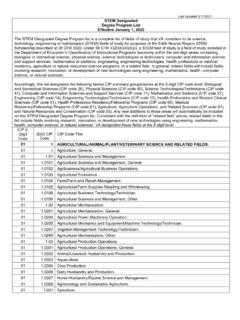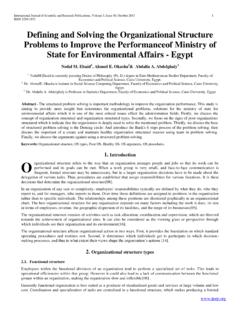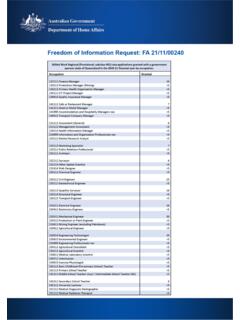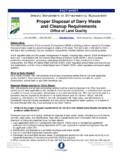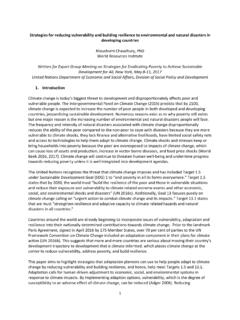Transcription of Applying Strategic Environmental Assessment
1 DAC Guidelines and Reference Series Applying Strategic Environmental AssessmentGOOD PRACTICE GUIDANCE FOR DEVELOPMENT CO-OPERATION DAC Guidelines and Reference SeriesApplying Strategic Environmental Assessment GOOD PRACTICE GUIDANCE FOR DEVELOPMENT CO-OPERATIONM illennium Development Goal 7 calls for ensuring Environmental sustainability by integrating the principles of sustainable development into country policies and programmes. Strategic Environmental Assessment (SEA) is one of the main tools available to achieve this integration. The Paris Declaration on Aid Effectiveness, agreed by over one hundred donors and developing countries in March 2005, commits donors and partner countries jointly to develop and apply common approaches for Strategic Environmental Assessment at the sector and national levels . This good practice guidance explains the benefits of using SEA in development co-operation and sets out key steps for its application based on recent experiences.
2 Twelve different entry points are identified for the practical application of SEA in development co-operation. For each entry point, the text provides a guidance note with a checklist of questions and hands-on case studies. Evaluation and capacity development for SEA processes are also though the publication is aimed primarily at professionals working in development agencies and developing country governments, it will also be of value to other policy analysts and includes a preface by Rt. Hon. Hilary Benn MP, Secretary of State for International Development, UK, Kemal Dervis, Administrator, UNDP, and Richard Manning, Chair of the OECD Development Assistance OECD DAC Task Team on Strategic Environmental Assessment , which prepared this guidance, received the 2006 Institutional Award of the International Association for Impact Assessment (IAIA). The full text of this book is available on line via these links: with access to all OECD books on line should use this link: is the OECD s online library of books, periodicals and statistical databases.
3 For more information about this award-winning service and free trials ask your librarian, or write to us at w w. o e c d . o r gISBN 92-64-02657-6 43 2006 14 1 P-:HSTCQE=UW[Z\Z: Applying Strategic Environmental AssessmentDAC Guidelines and Reference Series ORGANISATION FOR ECONOMIC CO-OPERATION AND DEVELOPMENTDAC Guidelines and Reference SeriesApplying Strategic Environmental AssessmentGOOD PRACTICE GUIDANCE FOR DEVELOPMENT CO-OPERATIONORGANISATION FOR ECONOMIC CO-OPERATION AND DEVELOPMENTThe OECD is a unique forum where the governments of 30 democracies work together toaddress the economic, social and Environmental challenges of globalisation. The OECD is also atthe forefront of efforts to understand and to help governments respond to new developments andconcerns, such as corporate governance, the information economy and the challenges of anageing population.]
4 The Organisation provides a setting where governments can compare policyexperiences, seek answers to common problems, identify good practice and work to co-ordinatedomestic and international OECD member countries are: Australia, Austria, Belgium, Canada, the Czech Republic,Denmark, Finland, France, Germany, Greece, Hungary, Iceland, Ireland, Italy, Japan, Korea,Luxembourg, Mexico, the Netherlands, New Zealand, Norway, Poland, Portugal, the Slovak Republic,Spain, Sweden, Switzerland, Turkey, the United Kingdom and the United States. The Commission ofthe European Communities takes part in the work of the Publishing disseminates widely the results of the Organisation s statistics gathering andresearch on economic, social and Environmental issues, as well as the conventions, guidelines andstandards agreed by its available in French under the title:L valuation environnementale strat giqueGUIDE DE BONNES PRATIQUES DANS LE DOMAINE DE LA COOP RATION POUR LE D VELOPPEMENT OECD 2006No reproduction, copy, transmission or translation of this publication may be made without written permission.
5 Applications should be sent toOECD Publishing: or by fax (33-1) 45 24 99 30. Permission to photocopy a portion of this work should be addressed to the Centrefran ais d'exploitation du droit de copie (CFC), 20, rue des Grands-Augustins, 75006 Paris, France, fax (33-1) 46 34 67 19, or (forUS only) to Copyright Clearance Center (CCC), 222 Rosewood Drive Danvers, MA 01923, USA, fax (978) 646 8600, work is published on the responsibility of the Secretary-General of the OECD. Theopinions expressed and arguments employed herein do not necessarily reflect the officialviews of the Organisation or of the governments of its member Strategic Environmental Assessment ISBN 92-64-02657-6 OECD 20063 ForewordSustainable development is a global issue that OECD and developing countries can only achievethrough joint efforts. The OECD Development Assistance Committee (DAC) is a key forum wheremajor bilateral and multilateral donors work together to increase the effectiveness of their commonefforts to support sustainable development.
6 The DAC focuses, in particular, on how internationaldevelopment co-operation can help developing countries combat poverty and participate in the globaleconomy. The objective is to help shape the response of development co-operation at the policy andoperational work in the area of development and environment is carried out primarily through itsNetwork on Environment and Development Co-operation (ENVIRONET). In 2004, ENVIRONET established a Task Team on Strategic Environmental Assessment (SEA), in response to the demandfor guidance on the most efficient and effective application of SEA in the context of developmentco-operation. This Good Practice Guidance is the product of this work. It has involved acomprehensive consultation process with bilateral and multilateral development co-operationagencies, as well as representatives from partner countries and individual experts and practitionersfrom a wide range of developing and developed members are: Australia, Austria, Belgium, Canada, Denmark, Finland, France,Germany, Greece, Ireland, Italy, Japan, Luxembourg, Netherlands, New Zealand,Portugal, Norway, Spain, Sweden, Switzerland, United Kingdom, United States andCommission of the European Communities.
7 The International Monetary Fund (IMF),the United Nations Development Programme (UNDP), and the World Bank participatein the work of the DAC as Strategic Environmental Assessment ISBN 92-64-02657-6 OECD 20065 AcknowledgementsThis Guidance has been produced by the collective efforts of the OECD DAC ENVIRONET SEA TaskTeam, and co-opted experts from both developed and developing countries. Members of the SEA Task Team are: Jon Hobbs (DFID, London) (Chair); Linda Ghanime(UNDP, New York) (Vice-Chair); Harald Lossack, Jan-Peter Schemmel and Stephan Paulus (GTZ,Bonn and Berlin); Peter Croal, Bob Weir and Helene Gichenje (CIDA, Ottawa) and Tamara Levine(CIDA, Ottawa, now University of Sussex); Arnold Jacques de Dixmude (Ministry of ForeignAffairs, Belgium); Na g Cozannet (AFD, Paris); Jouko Eskelinen and Matti Nummelin (Ministry ofForeign affairs , Finland); Miriam Ciscar (AECS, Spain); Etienne Coyette, Simon Le-Grand andFrancoise Villette (Environment Directorate, European Commission, Brussels); Ellen Shipley (DFAT,Australia); Kaoru Kanoyashi and Kojma Takeharu (Japan); Elspeth Tarp, Jan Riemer andMerete Pedersen (DANIDA, Copenhagen).
8 Steve Bass (DFID, London, now IIED); Joseph Gamperl(KfW, Berlin); Inger-Marie Bjonness (Ministry of Foreign affairs , Oslo, now Norwegian Delegation tothe EU, Brussels) and Anne Kari Hansen Ovind (Ministry of Foreign affairs , Oslo); Rob van den Boom(DGIS, Netherlands); Tomas Andersson (Sida); Daniel Slunge, Olaf Drakenberg and Anders Ekbom(University of Gothenburg/Sida Helpdesk); Kulsum Ahmed, David Hanrahan, Fernando Loayza andJean Roger Mercier (World Bank, Washington DC); Laura Lee (UNDP, New York); James Leaton(WWF-UK); Alex Weaver (Council for Scientific and Industrial Research, South Africa);Elizabeth Brito (IADB, Washington DC); Paul Driver (consultant, UK); Jiri Dusik andSimona Kosikova (Regional Environment Centre for Central and Eastern Europe, Czech Republic);Hussein Abaza and Fulai Sheng (UNEP, Geneva); David Howlett (UNDP, Tanzania, now DFID EastKilbride); Peter Poulsen (DFID, London), Jean-Paul Penrose (DFID West Africa, now consultant inMozambique), Richard McNally (DFID London, now consultant in Viet Nam) and AndrewMcCoubray (DFID, Nairobi); Elizabeth Smith (EBRD, London); Gregory Woodsworth (UNDP, Nairobi,Kenya); Jean-Paul Ledant and Juan Palerm (EC-Environment Integration Help Desk in Development,Brussels); Rob Verheem (EIA Commission, Netherlands); Roger Gebbels and Tanya Burdett (UKODPM, London); Alfred Eberhardt (consultant to GTZ, Germany); John Horberry (consultant, UK);Peter Nelson (Land Use Consultants, UK); Steve Smith (Scott Wilson Consultants, UK); Barry Sadler(consultant to UNEP, based in Canada).
9 David Annandale (Murdoch University, Australia, nowconsultant to Government of Bhutan); Daniele Ponzi (Formerly AsDB, now with AfDB, Tunis);Dawn Montague (WWF USA); Bea Coolman (WWF International); Luc Hens (Free University ofBrussels); Marianne Fernagut (GRID Arendal); Barry Dalal-Clayton (IIED, London); Peter Tarr(Southern African Institute for Environmental Assessment , Namibia).R mi Paris and Jenny Hedman of the OECD/DAC Secretariat provided substantive andmanagerial assistance to the Task Team while Maria Consolati provided invaluable secretarialassistance. Steve Bass and Pierre Giroux, former and current Chairs of ENVIRONET, providedguidance and advice throughout the secretariat services were provided by the International Institute for Environment andDevelopment (IIED).ACKNOWLEDGEMENTSAPPLYING Strategic Environmental Assessment ISBN 92-64-02657-6 OECD 20066A considerable number of individuals, many from developing countries, participated in aninternational conference on SEA organised by the Task Team at Halong Bay, Viet Nam (2005), inworkshops organised by the Task Team at the annual meetings of the International Association forImpact Assessment (IAIA) in Marrakech (2003) and Prague (2005)
10 , and in Task Team meetings heldin Brussels, London, Paris and work of the Task Team has been made possible through financial support provided by TheRoyal Norwegian Ministry of Foreign affairs , Belgian Ministry of Foreign affairs , Finnish Ministry ofForeign affairs , GTZ, Sida, UK DFID, UNDP, UNEP and the World OF CONTENTSAPPLYING Strategic Environmental Assessment ISBN 92-64-02657-6 OECD 20067Ta b l e o f C o n t e n t sAcronyms ..12 Preface..14 Executive Summary ..17 Part IChapter .. New approaches to development co-operation .. SEA meets the challenge of more Strategic development co-operation .. Legal requirements for SEA .. SEA supports donors harmonisation and alignment efforts .. What does this Guidance seek to achieve? .. How should this Guidance be used? .. Agreed development approaches underpinning this Guidance ..28 Chapter Strategic Environmental Assessment .










